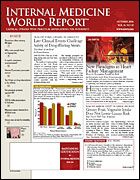Can Compound Found in Brown Seaweed Promote Weight Loss?
From the American Chemical Society
SAN FRANCISCO—A brown seaweed often used in many Asian dishes contains a compound that appears to promote weight loss by reducing the accumulation of fat, according to data presented at the 232nd National Meeting of the American Chemical Society.
When fed to obese test animals, the compound, called fucoxanthin, resulted in a 5% to 10% weight reduction. It could be developed into a natural extract or drug that would help fight obesity in humans by targeting abdominal fat, the researchers noted.
Fucoxanthin, the pigment that gives brown seaweed its color, is found in high levels in several different types of brown seaweed, including a kelp used in traditional Japanese miso soup. It is not found in abundance, however, in green or red seaweed.
The brown seaweed used in the current study was Undaria pinnatifida, a type of kelp also known as wakame.
“I hope that our study [leads to a way to] help reduce obesity in the United States and elsewhere,” said lead author Kazuo Miyashita, PhD, of Hokkaido University, Japan.
The study involved >200 rats and mice. In obese animals fed fucoxanthin, the compound appeared to stimulate uncoupling protein 1 (UCP1), a protein that causes fat oxidation and the conversion of energy to heat.
UCP1 is found in white adipose tissue, the type of fat that surrounds internal organs. As the abdominal area contains abundant adipose tissue, fucoxanthin might be effective at shrinking oversized guts, according to Dr Miyashita. This is the first time a natural food component has been shown to reduce fat by targeting the UCP1 protein, he notes. The pigment also appeared to stimulate the liver to produce a compound called docosahexaenoic acid (DHA), a type of omega-3 fatty acid, at levels comparable to those seen with fish oil supplementation. Increased levels of DHA reduce low-density lipoprotein, a known contributor to obesity and heart disease.
Unlike fish oil supplements, fucoxanthin has no unpleasant smell. No adverse side effects from fucoxanthin were reported in the mice and rats used in the study. But eating seaweed is not the quickest or most convenient way to achieve weight loss, Dr Miyashita cautions, adding that a person would probably need to eat massive amounts of brown seaweed daily to undergo noticeable weight loss. This is because fucoxanthin is tightly bound to proteins in the seaweed and is not easily absorbed in the form of whole seaweed.
Dr Miyashita hopes, however, to extract the most active form of fucoxanthin from brown seaweed so that it could be developed into a pill that can be taken daily or as needed by those who wish to lose weight.
Human studies are planned, but it may take 3 to 5 years before such an antiobesity pill will be available to consumers. Until then, continue to recommend a well-balanced diet and plenty of exercise.
